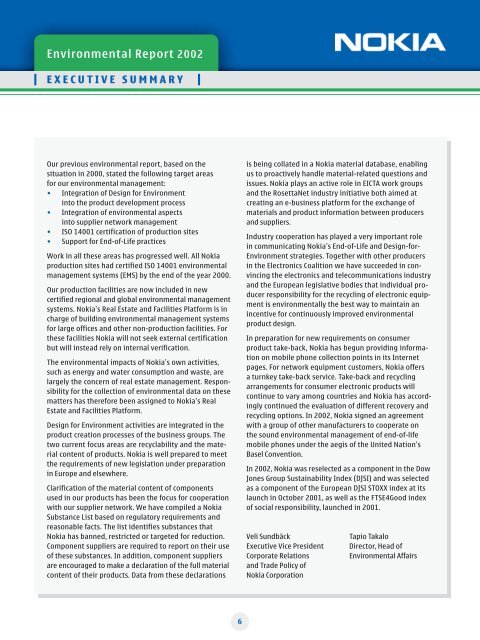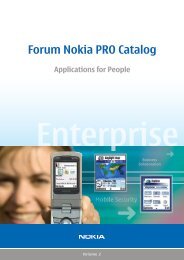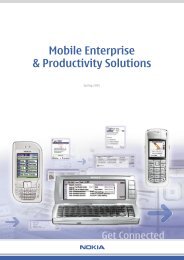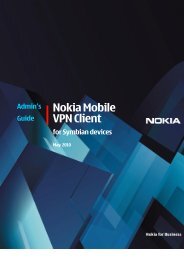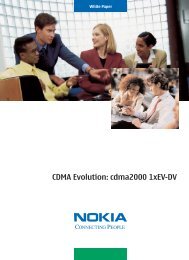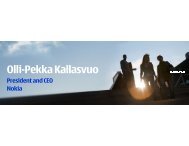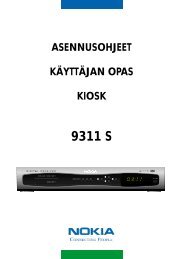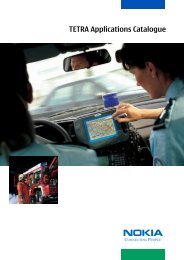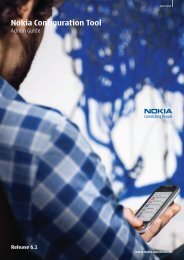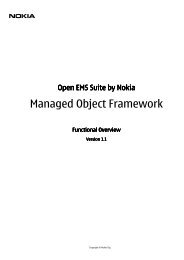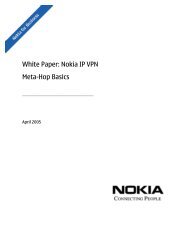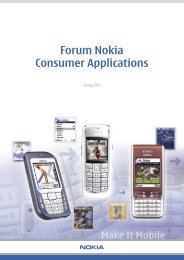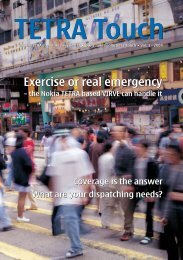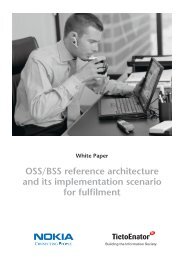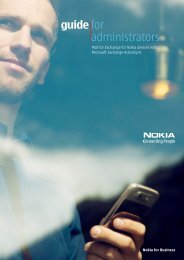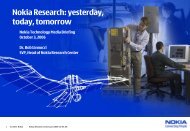Nokia Environmental Report 2002
Nokia Environmental Report 2002
Nokia Environmental Report 2002
Create successful ePaper yourself
Turn your PDF publications into a flip-book with our unique Google optimized e-Paper software.
<strong>Environmental</strong> <strong>Report</strong> <strong>2002</strong><br />
E X E C U T I V E S U M M A R Y<br />
Our previous environmental report, based on the<br />
situation in 2000, stated the following target areas<br />
for our environmental management:<br />
• Integration of Design for Environment<br />
into the product development process<br />
• Integration of environmental aspects<br />
into supplier network management<br />
• ISO 14001 certification of production sites<br />
• Support for End-of-Life practices<br />
Work in all these areas has progressed well. All <strong>Nokia</strong><br />
production sites had certified ISO 14001 environmental<br />
management systems (EMS) by the end of the year 2000.<br />
Our production facilities are now included in new<br />
certified regional and global environmental management<br />
systems. <strong>Nokia</strong>’s Real Estate and Facilities Platform is in<br />
charge of building environmental management systems<br />
for large offices and other non-production facilities. For<br />
these facilities <strong>Nokia</strong> will not seek external certification<br />
but will instead rely on internal verification.<br />
The environmental impacts of <strong>Nokia</strong>’s own activities,<br />
such as energy and water consumption and waste, are<br />
largely the concern of real estate management. Responsibility<br />
for the collection of environmental data on these<br />
matters has therefore been assigned to <strong>Nokia</strong>’s Real<br />
Estate and Facilities Platform.<br />
Design for Environment activities are integrated in the<br />
product creation processes of the business groups. The<br />
two current focus areas are recyclability and the material<br />
content of products. <strong>Nokia</strong> is well prepared to meet<br />
the requirements of new legislation under preparation<br />
in Europe and elsewhere.<br />
Clarification of the material content of components<br />
used in our products has been the focus for cooperation<br />
with our supplier network. We have compiled a <strong>Nokia</strong><br />
Substance List based on regulatory requirements and<br />
reasonable facts. The list identifies substances that<br />
<strong>Nokia</strong> has banned, restricted or targeted for reduction.<br />
Component suppliers are required to report on their use<br />
of these substances. In addition, component suppliers<br />
are encouraged to make a declaration of the full material<br />
content of their products. Data from these declarations<br />
6<br />
is being collated in a <strong>Nokia</strong> material database, enabling<br />
us to proactively handle material-related questions and<br />
issues. <strong>Nokia</strong> plays an active role in EICTA work groups<br />
and the RosettaNet industry initiative both aimed at<br />
creating an e-business platform for the exchange of<br />
materials and product information between producers<br />
and suppliers.<br />
Industry cooperation has played a very important role<br />
in communicating <strong>Nokia</strong>’s End-of-Life and Design-for-<br />
Environment strategies. Together with other producers<br />
in the Electronics Coalition we have succeeded in con-<br />
vincing the electronics and telecommunications industry<br />
and the European legislative bodies that individual pro-<br />
ducer responsibility for the recycling of electronic equip-<br />
ment is environmentally the best way to maintain an<br />
incentive for continuously improved environmental<br />
product design.<br />
In preparation for new requirements on consumer<br />
product take-back, <strong>Nokia</strong> has begun providing information<br />
on mobile phone collection points in its Internet<br />
pages. For network equipment customers, <strong>Nokia</strong> offers<br />
a turnkey take-back service. Take-back and recycling<br />
arrangements for consumer electronic products will<br />
continue to vary among countries and <strong>Nokia</strong> has accordingly<br />
continued the evaluation of different recovery and<br />
recycling options. In <strong>2002</strong>, <strong>Nokia</strong> signed an agreement<br />
with a group of other manufacturers to cooperate on<br />
the sound environmental management of end-of-life<br />
mobile phones under the aegis of the United Nation’s<br />
Basel Convention.<br />
In <strong>2002</strong>, <strong>Nokia</strong> was reselected as a component in the Dow<br />
Jones Group Sustainability Index (DJSI) and was selected<br />
as a component of the European DJSI STOXX index at its<br />
launch in October 2001, as well as the FTSE4Good index<br />
of social responsibility, launched in 2001.<br />
Veli Sundbäck Tapio Takalo<br />
Executive Vice President Director, Head of<br />
Corporate Relations <strong>Environmental</strong> Affairs<br />
and Trade Policy of<br />
<strong>Nokia</strong> Corporation


